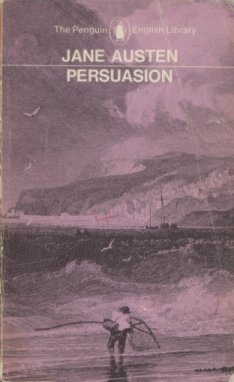Austen Jane
Persuasion

This is Jane Austenīs last novel, only published after her death, in 1818. And it is Austen revisited, as I first read this book 1966 and found it rather dull. And, I must admit, Austen has learnt such a lot in these 40 years. I now consider “Persuasion” her best, bitterest story.
Whereas in her earlier novels, at least some of her sisters, fathers, relations are nice, understanding persons, here Anne Elliott, the heroine, has no-one she can confide in or rely on. Her father is the silliest person possible, though, or maybe because he is of noble descent; he is a worthy counterpart of Lady de Burgh. Anneīs two sisters are just as stupid and selfish. They treat Anne either as invisible or as a humble servant.
Her expectations in life are bleak after she rejected an offer of marriage 7 years ago. Her close friend Lady Russell had persuaded her not to marry because her lover was in the navy and had no sufficient income. This same man, now a rich Captain Wentworth, comes back to Anneīs place looking for a wife. We all know, of course, that everything will end happily, but Austenīs voice sometimes sounds so bitter, sarcastic that we recognize how Austen must have felt, imprisoned in her small home, surrounded by narrow-minded selfish relatives, with no Captain Wentworth to rescue her.
The editor D.W.Harding leaves the reader in no doubt about that in his introduction to the novel. And the added “Memoir of Jane Austen” written by her nephew J.E. Austen-Leigh (!) serves as sad proof . He wrote this memoir 50 years after Jane Austenīs death when he was 71. He only knew his aunt, when he was very young, but sees it as his duty to tell the interested world, what a decent, noble, righteous person his aunt had been. He even calls her pious, although he is in considerable trouble to explain, why all the clergy in her novels are described as extremely stupid and overly pious. Austen-Leigh was a clergyman! He encloses some of Janeīs letters, but we know, that her sister Cassandra had taken great care to destroy every letter that the family thought not fitting. Austen-Leigh quotes one comment by a Miss Mitford, that Jane Austen as a young girl was “the prettiest, silliest, most affected husband-hunting butterfly she ever remembers”. But he only does so to prove elaborately, that this Miss Mitford had never known Jane personally.